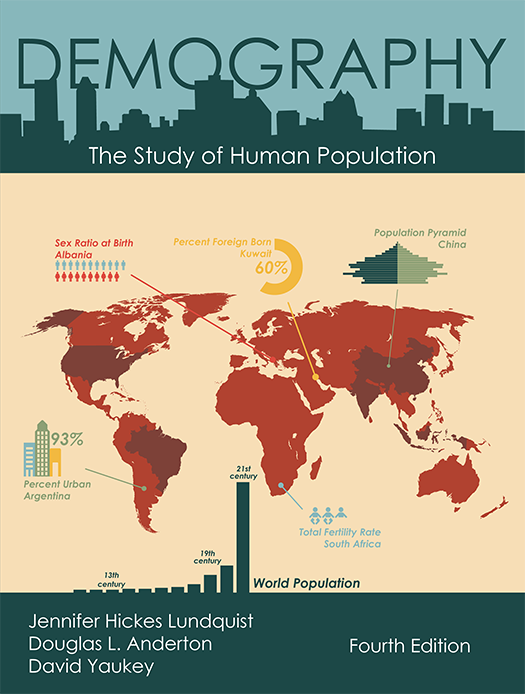about the book
The population processes in which we all participate are compared, contrasted, and synthesized into understandable trends in the latest edition of this widely acclaimed text. The authors’ cogent analysis encompasses demographic milestones like surpassing the seven billion population mark and becoming a majority urban population for the first time in human history, as well as the repercussions of a global financial crisis and the implications of two important ongoing trends: aging and fertility decline.
New data, examples, and discussions of emerging demographic issues are incorporated throughout the value-priced Fourth Edition, along with graphics that highlight trends and facilitate comparisons among world regions. This pedagogically rich volume also includes propositions for debate and end-of-chapter exercises that allow readers to become comfortable with the quantitative tools that demographers use to measure and describe populations. Moreover, users will learn about some of the people behind the research that informs this text in a new feature called Careers in Demography.
About the Authors
JENNIFER HICKES LUNDQUIST:
Jennifer Lundquist is a professor in the Department of Sociology and Senior Associate Dean of Research in the College of Social and Behavioral Sciences at the University of Massachusetts Amherst. A sociologist and demographer, she examines how racial, ethnic and gender inequalities are perpetuated and sometimes undone in various institutional settings, such as the workplace, the dating/marriage market and in families. Her major areas of scholarship include analyzing online dating behavior to better understand how interracial interaction contributes to continued racial hierarchies; taking advantage of unique social continuities in the U.S. military that provide insight into what drives racial disparities in health, family formation behaviors, criminal justice reform and other outcomes in larger society; tracing the development and impact on the American welfare system of the U.S. prison and military system “submerged states”; and tracing how institutions and their policies impact the changing American life course in the post-industrial economy. By exploring alternative institutional contexts, she casts a number of important social problems in a new light.
DOUGLAS L. ANDERTON:
Dr. Douglas L. Anderton’sresearch emphasizes statistical demography with application to population-environment interactions, environmental health and historical demography. He is the Chair of the Department of Sociology at the University of South Carolina. He is a Fellow of the American Statistical Association and an elected member of the Sociological Research Association. He earned an undergraduate degree in economics, a master’s in economics, and a Ph.D. in sociology, all from the University of Utah. He has also taught at the University of Chicago and the University of Massachusetts Amherst.
DAVID YAUKEY:
David William Yaukey, 85, of Amherst, professor emeritus of Sociology, died Feb. 9 at Cooley Dickinson Hospital from complications following surgery. Born in Japan, he was the son of China missionaries. He graduated from Oberlin College in 1949, taking one year off to serve in the U.S. Navy at the end of World War II. He then earned his master’s degree and doctorate in sociology at Washington State College and the University of Washington, respectively. His professional interest was in international demography, and particularly in the world population explosion. That interest eventually took him and his family to a series of overseas residences. He met his wife Barbara in 1956 in Lebanon, where he was teaching at the American University of Beirut and she at the American Community School. They later lived in East Pakistan, Chile and Switzerland, finally returned to China in 1986 and 1987 on a Fulbright lectureship.
His signal research accomplishment was to carry out a pioneering fertility survey in Lebanon in 1958, supported by the Population Council. This was a precursor for a series of such surveys in less-developed countries that encouraged and supported their family planning programs and shortened their population explosions. The report of this survey, written at the Office of Population Research, Princeton University, was the first of his three books. The last is a textbook in demography, first published in 1986 and now (with co-authors) in its fourth edition.
EIKO STRADER, RESEARCH ASSISTANT:
Eiko Strader is an assistant professor of Public Policy and Women's, Gender & Sexuality Studies at the George Washington University. She worked on this textbook as a research assistant while she was a doctoral candidate in Sociology at the University of Massachusetts Amherst. She studies inequality, gender, work, welfare states, and immigration, and has published on related issues.

